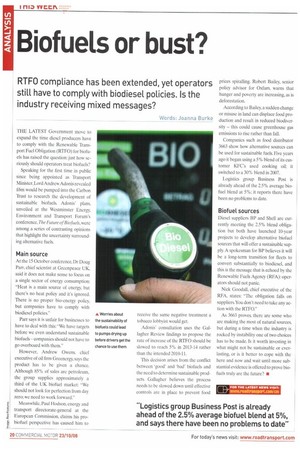Biofuels or bust?
Page 20

If you've noticed an error in this article please click here to report it so we can fix it.
RTFO compliance has been extended, yet operators still have to comply with biodiesel policies. Is the industry receiving mixed messages?
Words: Joanna Burke THE LATEST Government move to expand the time diesel producers have to comply with the Renewable Transport Fuel Obligation (RTFO) for biofuels has raised the question: just how seriously should operators treat biofuels?
Speaking for the first time in public since being appointed as Transport Minister, Lord Andrew Adonis revealed 16m would be pumped into the Carbon Trust to research the development of sustainable biofuels. Adonis' plans, unveiled at the Westminster Energy, Environment and Transport Forum's conference, The Future of Biofuels, were among a series of contrasting opinions that highlight the uncertainty surrounding alternative fuels.
Main source At the 15 October conference, Dr Doug Parr, chief scientist at Greenpeace UK, said it does not make sense to focus on a single sector of energy consumption: "Heat is a main source of energy, but there's no heat policy and it's ignored. There is no proper bio-energy policy, but companies have to comply with biodiesel policies."
Parr says it is unfair for businesses to have to deal with this: "We have targets before we even understand sustainable biofuels — companies should not have to go overboard with them."
However, Andrew Owens, chief executive of oil firm Greenergy, says the product has to be given a chance. Although 85% of sales are petroleum, the group supplies approximately a third of the UK biofuel market: "We should not look for perfection from day zero; we need to work forward," Meanwhile, Paul Hodson. energy and transport directorate-general at the European Commission, claims his probiofuel perspective has caused him to receive the same negative treatment a tobacco lobbyist would get.
Adonis' consultation uses the Gallagher Review findings to propose the rate of increase of the RTFO should be slowed to reach 5% in 2013-14 rather than the intended 2010-11.
This decision arises from the conflict between 'good' and 'bad' biofuels and the need to determine sustainable products. Gallagher believes the process needs to be slowed down until effective controls are in place to prevent food prices spiralling. Robert Bailey, senior policy advisor for Oxfam. warns that hunger and poverty are increasing, as is deforestation.
According to Bailey, a sudden change or misuse in land can displace food production and result in reduced biodiversity — this could cause greenhouse gas emissions to rise rather than fall.
Companies such as food distributor 3663 show how alternative sources can be used for sustainable fuels. Five years ago it began using a 5% blend of its customer KFC's used cooking oil: it switched to a 30% blend in 2007.
Logistics group Business Post is already ahead of the 2.5% average biofuel blend at 5%; it reports there have been no problems to date.
Biofuel sources Diesel suppliers BP and Shell are currently meeting the 2.5% blend obligation but both have launched 10-year projects to develop alternative biofuel sources that will offer a sustainable supply. A spokesman for BP believes it will be a long-term transition for fleets to convert substantially to biodiesel, and this is the message that is echoed by the Renewable Fuels Agency (RFA): operators should not panic.
Nick Goodall, chief executive of the RFA. states: "The obligation falls on suppliers. You don't need to take any action with the RTFO."
As 3663 proves, there are some who are making the most of natural sources. but during a time when the industry is rocked by instability one of two choices has to be made. Is it worth investing in what might not be sustainable or everlasting, or is it better to cope with the here and now and wait until more substantial evidence is offered to prove biofuels truly are the future? •








































































































































































